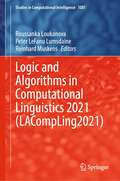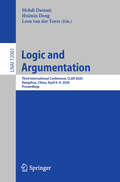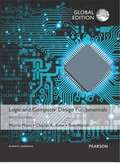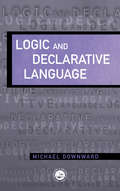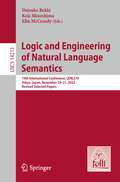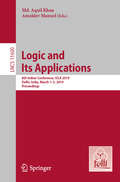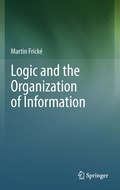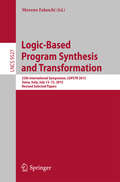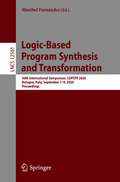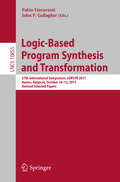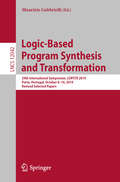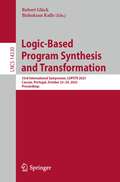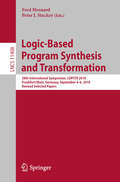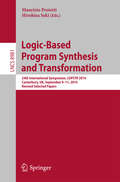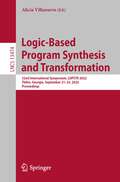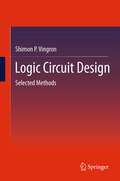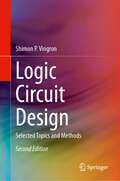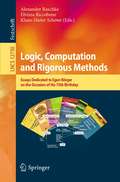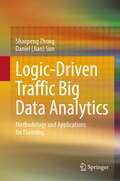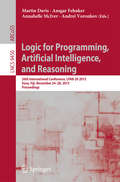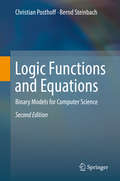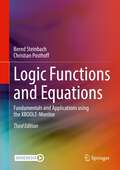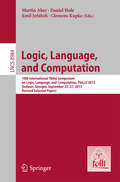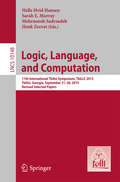- Table View
- List View
Logic and Algorithms in Computational Linguistics 2021 (Studies in Computational Intelligence #1081)
by Roussanka Loukanova Peter LeFanu Lumsdaine Reinhard MuskensThis book assesses the place of logic, mathematics, and computer science in present day, interdisciplinary areas of computational linguistics. Computational linguistics studies natural language in its various manifestations from a computational point of view, both on the theoretical level (modeling grammar modules dealing with natural language form and meaning and the relation between these two) and on the practical level (developing applications for language and speech technology). It is a collection of chapters presenting new and future research. The book focuses mainly on logical approaches to computational processing of natural language and on the applicability of methods and techniques from the study of formal languages, programming, and other specification languages. It presents work from other approaches to linguistics, as well, especially because they inspire new work and approaches.
Logic and Argumentation: Third International Conference, CLAR 2020, Hangzhou, China, April 6–9, 2020, Proceedings (Lecture Notes in Computer Science #12061)
by Mehdi Dastani Huimin Dong Leon van der TorreThis book constitutes the refereed proceedings of the Third International Conference on Logic and Argumentation, CLAR 2020, held in Hangzhou, China, in April 2020. The 14 full and 7 short papers presented were carefully reviewed and selected from 31 submissions. The papers cover the focus of the CLAR series, including formal models of argumentation, logics for decision making and uncertainreasoning, formal models of evidence, con rmation, and justi cation, logics forgroup cognition and social network, reasoning about norms, formal representationsof natural language and legal texts, as well as applications of argumentationon climate engineering.
Logic and Computer Design Fundamentals
by Charles R. Kime Tom Martin M. Morris ManoFor courses in Logic and Computer design. Understanding Logic and Computer Design for All Audiences Logic and Computer Design Fundamentals is a thoroughly up-to-date text that makes logic design, digital system design, and computer design available to students of all levels. The Fifth Edition brings this widely recognized source to modern standards by ensuring that all information is relevant and contemporary. The material focuses on industry trends and successfully bridges the gap between the much higher levels of abstraction students in the field must work with today than in the past. Broadly covering logic and computer design, Logic and Computer Design Fundamentals is a flexibly organized source material that allows instructors to tailor its use to a wide range of student audiences.
Logic And Declarative Language
by M. DownwardLogic has acquired a reputation for difficulty, perhaps because many of the approaches adopted have been more suitable for mathematicians than computer scientists. This book shows that the subject is not inherently difficult and that the connections between logic and declarative language are straightforward. Many exercises have been included in the hope that these will lead to a much greater confidence in manual proofs, therefore leading to a greater confidence in automated proofs.
Logic and Engineering of Natural Language Semantics: 19th International Conference, LENLS19, Tokyo, Japan, November 19–21, 2022, Revised Selected Papers (Lecture Notes in Computer Science #14213)
by Daisuke Bekki Koji Mineshima Elin McCreadyThis volume LNCS 14213 constitutes the refereed proceedings of the 19th International Conference, LENLS 2019, held in November 2022, in Tokyo, Japan. The 13 full papers presented were carefully reviewed and selected from 34 submissions. The conference focuses on theoretical and computational linguistics covering topics ranging from syntax, semantics, and pragmatics to the philosophy of language and natural language processing.
Logic and Its Applications: 8th Indian Conference, ICLA 2019, Delhi, India, March 1-5, 2019, Proceedings (Lecture Notes in Computer Science #11600)
by Md. Aquil Khan Amaldev ManuelThis book collects the refereed proceedings of the 8th Indian Conference on Logic and Its Applications, ICLA 2019, held in Delhi, India, in March 2019. The volume contains 13 full revised papers along with 6 invited talks presented at the conference. The aim of this conference series is to bring together researchers from a wide variety of fields in which formal logic plays a significant role. Areas of interest include mathematical and philosophical logic, computer science logic, foundations and philosophy of mathematics and the sciences, use of formal logic in areas of theoretical computer science and artificial intelligence, logic and linguistics, and the relationship between logic and other branches of knowledge. Of special interest are studies in systems of logic in the Indian tradition, and historical research on logic.
Logic and the Organization of Information
by Martin FrickéLogic and the Organization of Information closely examines the historical and contemporary methodologies used to catalogue information objects--books, ebooks, journals, articles, web pages, images, emails, podcasts and more--in the digital era. This book provides an in-depth technical background for digital librarianship, and covers a broad range of theoretical and practical topics including: classification theory, topic annotation, automatic clustering, generalized synonymy and concept indexing, distributed libraries, semantic web ontologies and Simple Knowledge Organization System (SKOS). It also analyzes the challenges facing today's information architects, and outlines a series of techniques for overcoming them. Logic and the Organization of Information is intended for practitioners and professionals working at a design level as a reference book for digital librarianship. Advanced-level students, researchers and academics studying information science, library science, digital libraries and computer science will also find this book invaluable.
Logic-Based Program Synthesis and Transformation
by Moreno FalaschiThis book constitutes the thoroughly refereedpost-conference proceedings of the 25th International Symposium on Logic-BasedProgram Synthesis and Transformation, LOPSTR 2015, held in Siena, Italy, inJuly 2015. The 21 revised full papers presented together with 3invited talks were carefully reviewed and selected from 30 submissions. The aimof the LOPSTR series is to stimulate and promote international research andcollaboration on logic-based program development. LOPSTR is open tocontributions in all aspects of logic-based program development, all stages ofthe software life cycle, and issues of both programming-in-the-small andprogramming-in-the-large.
Logic-Based Program Synthesis and Transformation: 30th International Symposium, LOPSTR 2020, Bologna, Italy, September 7–9, 2020, Proceedings (Lecture Notes in Computer Science #12561)
by Maribel FernándezThis book constitutes the refereed proceedings of the 30th International Conference on Logic-Based Program Synthesis and Transformation, LOPSTR 2020, which was held during September 7-9, 2020. The 15 papers presented in this volume were carefully reviewed and selected from a total of 31 submissions. The book also contains two invited talks in full paper length. The contributions were organized in topical sections named: rewriting; unification; types; verification; model checking and probabilistic programming; program analysis and testing; and logics.
Logic-Based Program Synthesis and Transformation: 27th International Symposium, LOPSTR 2017, Namur, Belgium, October 10-12, 2017, Revised Selected Papers (Lecture Notes in Computer Science #10855)
by Fabio Fioravanti John P. GallagherThis book constitutes the thoroughly refereed post-conference proceedings of the 27th International Symposium on Logic-Based Program Synthesis and Transformation, LOPSTR 2017, held in Namur, Belgium, in October 2017. The 19 revised full papers were carefully reviewed and selected from 29 submissions. In addition to the 19 revised papers, this volume includes the abstracts of the invited talks by three outstanding speakers: Sumit Gulwani, Marieke Huisman, and Grigore Roşu. The aim of the LOPSTR series is to stimulate and promote international research and collaboration on logic-based program development. LOPSTR is open to contributions in all aspects of logic-based program development, all stages of the software life cycle, and issues of both programming-in-the-small and programming-in-the-large. LOPSTR traditionally solicits contributions, in any language paradigm, in the areas of synthesis, specification, transformation, analysis and verification, specialization, testing and certification, composition, program/model manipulation, optimization, transformational techniques in SE, inversion, applications, and tools.
Logic-Based Program Synthesis and Transformation: 29th International Symposium, LOPSTR 2019, Porto, Portugal, October 8–10, 2019, Revised Selected Papers (Lecture Notes in Computer Science #12042)
by Maurizio GabbrielliThis book constitutes the thoroughly refereed post-conference proceedings of the 29th International Symposium on Logic-Based Program Synthesis and Transformation, LOPSTR 2019, held in Porto, Portugal, in October 2019. The 15 revised full papers were carefully reviewed and selected from 32 submissions. In addition to the 15 papers, this volume includes 2 invited papers. The symposium cover all aspects of logic-based program development, stages of the software life cycle, and issues of both programming-in-the-small and programming-in-the-large. This year LOPSTR extends its traditional topics to include also logic-based program development based on integration of sub-symbolic and symbolic models, on machine learning techniques and on differential semantics. The papers are grouped into the following topics: static analysis, program synthesis, constraints and unification, debugging and verification, and program transformation.
Logic-Based Program Synthesis and Transformation: 33rd International Symposium, LOPSTR 2023, Cascais, Portugal, October 23-24, 2023, Proceedings (Lecture Notes in Computer Science #14330)
by Robert Glück Bishoksan KafleThis book constitutes the refereed proceedings of the 33rd International Symposium on Logic-Based Program Synthesis and Transformation, LOPSTR 2023, held in Cascais, Portugal, during October 23-24, 2023. The 8 full papers and 4 short papers included in this book were carefully reviewed and selected from 29 submissions. They were organized in topical sections as follows: Horn Clauses Analysis, Transformation and Synthesis; Static analysis and Type systems; Unification and substitution in (C)LP; and Knowledge representation and AI-based learning.
Logic-Based Program Synthesis and Transformation: 28th International Symposium, LOPSTR 2018, Frankfurt/Main, Germany, September 4-6, 2018, Revised Selected Papers (Lecture Notes in Computer Science #11408)
by Fred Mesnard Peter J. StuckeyThis book constitutes the thoroughly refereed post-conference proceedings of the 28th International Symposium on Logic-Based Program Synthesis and Transformation, LOPSTR 2018, held in Frankfurt/Main, Germany, in September 2018.The 11 revised full papers were carefully reviewed and selected from 29 submissions. In addition to the 11 papers, this volume includes 3 abstracts of invited talks and 2 abstracts of invited tutorials. The papers are grouped into the following topics: analysis of term rewriting; logic-based distributed/concurrent programming; analysis of logic programming; and program analysis.
Logic-Based Program Synthesis and Transformation
by Maurizio Proietti Hirohisa SekiThis book constitutes the thoroughly refereed post-conference proceedings of the 24th International Symposium on Logic-Based Program Synthesis and Transformation, LOPSTR 2014, held in Canterbury, UK, in September 2014. The 18 revised full papers presented together with 2 invited talks were carefully reviewed and selected from 34 submissions. The aim of the LOPSTR series is to stimulate and promote international research and collaboration on logic-based program development. The papers are organized along a set of thematic tracks: program analysis and transformation, constraint handling rules, termination analysis, security, program testing and verification, program synthesis, program derivation, semantic issues in logic programming and program transformation and optimization.
Logic-Based Program Synthesis and Transformation: 32nd International Symposium, LOPSTR 2022, Tbilisi, Georgia, September 21–23, 2022, Proceedings (Lecture Notes in Computer Science #13474)
by Alicia VillanuevaThis book constitutes the refereed proceedings of the 32nd International Symposium on Logic-Based Synthesis and Transformation, LOPSTR 2022, which was held during September 21-23, 2022. The 8 full papers were selected from 17 submissions and cover different aspects of logic-based program development, all stages of the software life cycle, and issues of both programming-in-the-small and programming-in-the-large.
Logic Circuit Design
by Shimon P. VingronIn three main divisions the book covers combinational circuits, latches, and asynchronous sequential circuits. Combinational circuits have no memorising ability, while sequential circuits have such an ability to various degrees. Latches are the simplest sequential circuits, ones with the shortest memory. The presentation is decidedly non-standard. The design of combinational circuits is discussed in an orthodox manner using normal forms and in an unorthodox manner using set-theoretical evaluation formulas relying heavily on Karnaugh maps. The latter approach allows for a new design technique called composition. Latches are covered very extensively. Their memory functions are expressed mathematically in a time-independent manner allowing the use of (normal, non-temporal) Boolean logic in their calculation. The theory of latches is then used as the basis for calculating asynchronous circuits. Asynchronous circuits are specified in a tree-representation, each internal node of the tree representing an internal latch of the circuit, the latches specified by the tree itself. The tree specification allows solutions of formidable problems such as algorithmic state assignment, finding equivalent states non-recursively, and verifying asynchronous circuits.
Logic Circuit Design: Selected Topics and Methods
by Shimon P. VingronThe 2nd edition has been thoroughly revised and is intended as a wakeup call in the stagnant and dormant field of switching algebra and logic circuit design. It presents the material in a concise but thorough way. The topics selected are an in-depth presentation of switching algebra, a theory of memory circuits (sometimes called flop flops), a new approach to asynchronous circuits, and a newly added part presenting a unique programming technique (or language) for programmable logic controllers (PLCs). Be ready for the unorthodox and controversial.
Logic, Computation and Rigorous Methods: Essays Dedicated to Egon Börger on the Occasion of His 75th Birthday (Lecture Notes in Computer Science #12750)
by Alexander Raschke Elvinia Riccobene Klaus-Dieter ScheweThis Festschrift was published in honor of Egon Börger on the occasion of his 75th birthday.It acknowledges Prof. Börger's inspiration as a scientist, author, mentor, and community organizer. Dedicated to a pioneer in the fields of logic and computer science, Egon Börger's research interests are unusual in scope, from programming languages to hardware architectures, software architectures, control systems, workflow and interaction patterns, business processes, web applications, and concurrent systems.The 18 invited contributions in this volume are by leading researchers in the areas of software engineering, programming languages, business information systems, and computer science logic.
Logic-Driven Traffic Big Data Analytics: Methodology and Applications for Planning
by Shaopeng Zhong Daniel (Jian) SunThis book starts from the relationship between urban built environment and travel behavior and focuses on analyzing the origin of traffic phenomena behind the data through multi-source traffic big data, which makes the book unique and different from the previous data-driven traffic big data analysis literature. This book focuses on understanding, estimating, predicting, and optimizing mobility patterns. Readers can find multi-source traffic big data processing methods, related statistical analysis models, and practical case applications from this book. This book bridges the gap between traffic big data, statistical analysis models, and mobility pattern analysis with a systematic investigation of traffic big data’s impact on mobility patterns and urban planning.
Logic for Programming, Artificial Intelligence, and Reasoning
by Martin Davis Ansgar Fehnker Annabelle Mciver Andrei VoronkovThis book constitutes the proceedings of the 20thInternational Conference on Logic for Programming, Artificial Intelligence, andReasoning, LPAR-20, held in November 2015, in Suva, Fiji. The 43 regular papers presented together with 1 invitedtalk included in this volume were carefully reviewed and selected from 92submissions. The series of International Conferences on Logic for Programming,Artificial Intelligence and Reasoning, LPAR, is a forum where, year after year,some of the most renowned researchers in the areas of logic, automatedreasoning, computational logic, programming languages and their applicationscome to present cutting-edge results, to discuss advances in these fields, andto exchange ideas in a scientifically emerging part of the world.
Logic Functions and Equations: Binary Models For Computer Science
by Christian Posthoff Bernd Steinbach<P><P>The field of binary Logics has two main areas of application, the Digital Design of Circuits (related to Electrical Engineering) and Propositional Logics (related to Mathematics, Artificial Intelligence, Complexity etc.). In both cases it is quite possible to teach the theoretical foundations and to do some exercises, but in both cases the examples that can be done in class and by hand are far away from examples that are relevant for practical problems. Therefore a software package called XBOOLE Monitor will be made available (downloadable, without additional fees), and the exercises given in Logic Functions and Equations can be solved by using this software package – in this way it is possible to solve a lot of relevant problems and to study the solutions based on this software. <P><P> The whole approach is based on the single and unique concept of Boolean Equations and Ternary Vectors as the basic data structure which makes it also easy to follow these ideas very easily, because the wide range of problems and solutions will be based on these two concepts.
Logic Functions and Equations: Fundamentals and Applications using the XBOOLE-Monitor
by Bernd Steinbach Christian PosthoffThe greatly expanded and updated 3rd edition of this textbook offers the reader a comprehensive introduction to the concepts of logic functions and equations and their applications across computer science and engineering. The authors’ approach emphasizes a thorough understanding of the fundamental principles as well as numerical and computer-based solution methods. The book provides insight into applications across propositional logic, binary arithmetic, coding, cryptography, complexity, logic design, and artificial intelligence.Updated throughout, some major additions for the 3rd edition include:a new chapter about the concepts contributing to the power of XBOOLE;a new chapter that introduces into the application of the XBOOLE-Monitor XBM 2;many tasks that support the readers in amplifying the learned content at the end of the chapters;solutions of a large subset of these tasks to confirm learning success;challenging tasks that need the power of the XBOOLE software for their solution.The XBOOLE-monitor XBM 2 software is used to solve the exercises; in this way the time-consuming and error-prone manipulation on the bit level is moved to an ordinary PC, more realistic tasks can be solved, and the challenges of thinking about algorithms leads to a higher level of education.
Logic in Computer Science: Modelling and Reasoning about Systems
by Michael Huth Mark RyanIn recent years, powerful tools for verifying hardware and software systems have been developed. Major companies, such as Intel, Siemens, BT, AT & T, and IBM have increasingly become interested in that technology. Students need a basic formal training that allows them to gain sufficient proficiency in using logic-based verification methods. This book addresses these needs by providing a sound basis in logic and an introduction to the logical frameworks used in modeling, specifying and verifying computer systems. Coverage provides a simple and clear presentation, detailing propositional and predicate logic as well as some specialized logics used for reasoning about the correctness of computer systems. The authors introduce a carefully chosen core of essential terminology; further technicalities are introduced only where they are required by the applications. Numerous examples are given, as well as a full exposition of a fast-growing technique for modeling and verifying computer systems, known as symbolic model checking. It will be an ideal introduction for undergraduate students. A worldwide web tutorial that supports the course activities and provides solutions to the sample exercises is available to instructors.
Logic, Language, and Computation
by Martin Aher Daniel Hole Emil Jeřábek Clemens KupkeThis book constitutes the refereed proceedings of the 10th International Tbilisi Symposium on Logic, Language and Computation, TbiLLC 2013, held in Gudauri, Georgia, in September 2013. The conference series is centered around the interaction between logic, language and computation. The contributions represent these three fields and the symposia aim to foster interaction between them. The book consists of 16 papers that were carefully reviewed and selected from 26 submissions. Each paper has passed through a rigorous peer-review process before being accepted for publication. The volume also contains two summaries of the tutorials that took place at the symposium: the one on admissible rules and the one on the formal semantics of aspectual meaning from a cross-linguistic perspective.
Logic, Language, and Computation
by Helle Hvid Hansen Sarah E. Murray Mehrnoosh Sadrzadeh Henk ZeevatThis book constitutes the refereed proceedings of the 11th International Tbilisi Symposium on Logic, Language and Computation, TbiLLC 2015, held in Tbilisi, Georgia, in September 2015. Initially there were 64 submissions, but 29 were actually presented of which 18 full papers have been accepted. The biennial conference series and the proceedings are representative of the aims of the organizing institutes: to promote the integrated study of logic, information and language. The scientific program consisted of tutorials, invited lectures, contributed talks, and two workshops.
